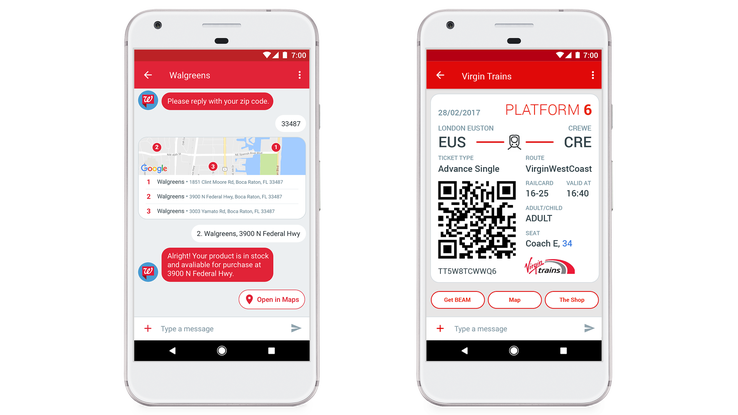

While messaging apps like WhatsApp, Messenger, Snapchat and WeChat rake in ever more users, features and relationships with key brands, and Apple’s iMessage continues to play strong with iPhone users, Google today announced a big step forward in its own strategy to bring a native, enhanced, native messaging service to more Android devices — a play for Google to help carriers raise their own native messaging game, and stay in the messaging game itself in the future.
Today the Android giant is announcing that 27 more carriers and device manufacturers have signed on to its list of supporting partners for Rich Communications Services (RCS) — an initiative to add more dynamic features like group chat, high-res photo sharing, read receipts and typing indicators as defaults to the basic, native Android Messages SMS chat app, which will now incorporate RCS alongside MMS and SMS services. Additionally, it’s also opening up a new program for brands and messaging providers to develop more enhanced messages for the platform.
Carrier partners include Vodafone, Orange, Deutsche Telekom and Globe, while OEMs now include LG, Motorola, Sony, HTC, ZTE, Micromax, Nokia, Archos, BQ, Cherry Mobile, Condor, Fly, General Mobile, Lanix, LeEco, Lava, Kyocera, MyPhone, QMobile, Symphony and Wiko, in addition to Google’s own Pixel and Android One handsets. It brings the number of subscribers now potentially covered by Android Messages to about 1 billion globally.
The announcement today will mean that these carriers and these handset makers will be preloading Android Messages on new devices to replace the current, standard Messages app. For those handsets already in the market on those carrier networks, users would need to download the new app in an update.
The news is timed in a specific way: we are days away from the big MWC mobile conference in Barcelona, and this is Google’s way of saying it is continuing to making more inroads into that market.
Google’s relationship with mobile carriers has blown hot and cold over the years. In this case, Google is a collaborator and friend, working with carriers to provide a unified service across all their Android devices that doesn’t relegate them to the role of “bit pipe” in the way that OTT apps like WhatsApp do.
But initiatives like Project Fi spell a different fate, where the search giant is constructing and offering complete phone packages to consumers for a fraction of what they pay directly to carriers, potentially threatening these carriers’ bread-and-butter business in the longer term. (Google is adding new features like Voice over LTE support to Project Fi all the time.)
The RCS news, however, is a definite warm wind.
For Google, RCS represents a way of getting control of the messaging experience and enhancing it to compete better against the cadre of popular messaging apps, and the iPhone-native iMessage, and certainly a more watertight way of owning the messaging experience compared to rolling out its own over-the-top messaging apps that compete head to head with the market leaders (see: Allo and Duo).
This is a strong story to sell to carriers, who have found users drop off their messaging networks in favor of other apps, resulting in lost revenues and unused assets in the carriers’ networks. This is a longish-term game for Google, which has been building out its efforts to expand RCS since acquiring Jibe Mobile back in 2015.
Developing better SMS services across multiple operators means that the messages will be interoperable (what you send on one network and handset will be seen that way when received on another network and handset) in the same way that apps are working today but SMS has only managed to in the most pared-down, text-only scenarios. But perhaps more importantly, it will let Google and those carriers start to add other kinds of services and revenue generation on top of basic messaging.
“RCS will upgrade today’s business messaging experience by enabling brands to send more useful and interactive messages,” writes Amir Sarhangi, Google’s head of RCS (who had been the CEO of Jibe back in the day), citing interactive SMS messages for flight-check-ins with boarding passes and terminal maps. “Businesses can also have a branded messaging experience with information about the business and the ability to share content like images, video clips, and gifs.”
To that end, Google is also announcing an Early Access Program for “businesses to learn and build with the technology, influence the roadmap and standards, and be first to offer their customers an upgraded messaging experience,” Sarhangi notes.
Early users include Virgin Trains, Walgreens, BlaBlaCar, Gamestop, G2A.com, IHG, LexisNexis Risk Solutions, Naturas, Papa Murphy’s, Philips, Sky, SONIC® Drive-In, Subway, and Time Inc. will work with messaging partners 3C, CLX Communications, Experian Marketing Services, MessageBird, mGage A Vivial Company, Mobivity, Movile, Vonage through Nexmo API Platform, OpenMarket, Waterfall, and Zipwhip to produce RCS messages.
Today’s new customer wins come about a week after Google announced another RCS carrier with significant reach: Norway’s Telenor, which runs several operations across Asia as well as in its home country. Others that have signed on to Google’s RCS include Sprint and Rogers in Canada.
Google also said that it will be showing off examples of RCS messaging at Mobile World Congress next week.

